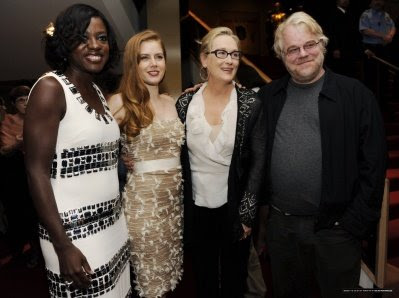 Today was a fairly positive day. I mean, how can anything go wrong on Oscar nomination day? Well, things can go wrong, but the anticipation is always pretty exhilarating.
Today was a fairly positive day. I mean, how can anything go wrong on Oscar nomination day? Well, things can go wrong, but the anticipation is always pretty exhilarating.I haven't seen many of the nominated films, but that won't stop me from sharing my two cents.
Like most people, The Dark Knight snub came as a surprise to me. And of course, all that love for The Reader was also quite unexpected. I've seen both and liked both, but honestly, The Dark Knight deserved the Best Picture and Best Director nominations a little more in comparison. The Reader may be a haunting piece of dramatic cinema, but The Dark Knight possesses a grand, epic vision that is usually void from the stereotypically vacuous superhero genre.
But I'm sure several people are glad to see The Dark Knight snub. The Reader is a pleasing enough alternative, I suppose.
And why does Kate Winslet have to be nominated for Best Leading Actress for The Reader? I guess she is technically the leading actress in the film but I'd rather see her with two nominations--one for Best Supporting Actress for The Reader (in which she would've gone head-to-head with Penelope Cruz, who is currently a bit of a lock as for her performance in Vicky Cristina Barcelona) and another for Best Leading Actress nomination for Revolutionary Road (I kinda-sorta want to see this). I mean, wouldn't that have been amazing? Now Winslet also has less of a chance to win in the Best Leading Actress category, especially with Meryl Streep in the running. And Anne Hathaway, with all that buzz for Rachel Getting Married, is tough competition too.
I'm torn by Amy Adams's Best Supporting Actress nomination for Doubt. She is undoubtedly (ha ha get it? okay, never mind) one of the greatest young talents working in film right now but her performance in Doubt isn't quite Oscar-worthy--in this year, or any year. And this is coming from someone who adores her sweet, charming, and all-around contagious naivete glee in Enchanted and Junebug. Adams does indeed deliver a strong performance in Doubt, but when compared to the likes of Streep, Philip Seymour Hoffman, and Viola Davis, she is overshadowed and left clinging to the last resort of fourth place. I guess I'll just consider this as the Academy's apology to Adams for not nominating her for Enchanted.
In a perfect world, David Kross (The Reader) and Gary Oldman (The Dark Knight) would both be nominated for Best Supporting Actor. (I know the Heath Ledger win is nearly inevitable--and will be completely, totally deserved--but these two supporting actors provided the beating heart to their films.) Yeah, I know I haven't seen enough movies to judge, but I'm just throwing it out there in case someone more knowledgeable and wiser actually agrees with me.
And as if the world doesn't know, Brangelina (both parts) are nominated for their work in film, not for the number of times their faces has appeared on a tabloid.
For the complete list of Oscar nominees, please head on over to IMDb's Oscar nominations page.

